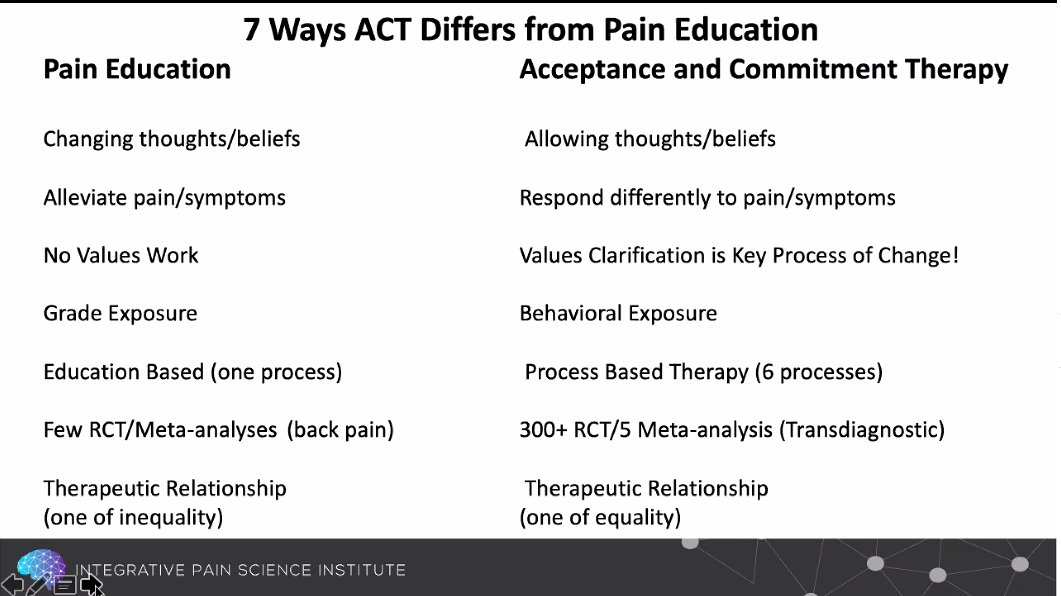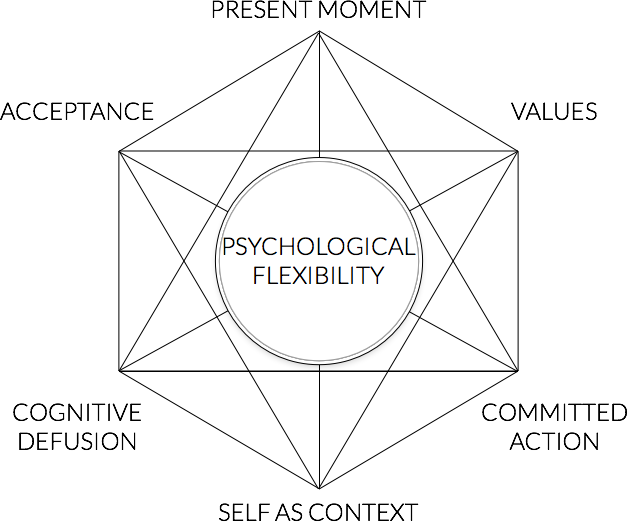Acceptance and Commitment Therapy vs. Pain Education, Do You Know Which is Best for Treating Pain?
By: Estimated reading time: 5 minutes
By: Estimated reading time: 5 minutes

Try this!
Put both your hands in front of your eyes, your eyes are now covered so that you cannot see the rest of the world.
Imagine your hands are your thoughts.
Your thoughts do exactly that, they come between you and the rest of the world, between you and your behaviour.
Now, slowly bring your hands down and start to see the world in front of you. Look at your hands ("thoughts"), you will notice that the thoughts are still there, but now, they are no longer getting in your way of seeing the world or taking action in your life.
~ ~ ~
What You Just Tried is an Integral Part of Acceptance Commitment Therapy (ACT).
As a practitioner, do you use ACT in your rehabilitative healthcare practice? Do you use pain education? Or do you instead opt for physical or manual therapy alone?
In this pain science continuing education physiotherapy course, Joe Tatta, founder of the Integrative Pain Science Institute, a company dedicated to reinventing pain care through education, research and professional training, will talk to you about both pain education and Acceptance Commitment Therapy. His discussion in this course is rooted in recent multidisciplinary scientific research as well as his professional experience.
His goal here is not to compare pain education and Acceptance Commitment Therapy. Joe believes that although these two approaches are different they are actually complementary and he employs both methodologies in his practice.
Here's What You'll Learn:
- How to overcome the partial reconceptualization of pain.
- Why educating people about pain may not move the needle.
- Why pain science education may be confusing to people with pain.
- How acceptance and mindfulness interventions differ from pain science education.
- What the science says about the effectiveness of ACT in treating a variety of chronic pain syndromes.
- How practitioners of all types are using ACT in their practice to improve pain outcomes.
- What the research shows.
- How you can get cutting-edge clinical training in ACT so you can help your patients break the cycle of suffering caused by chronic pain.
What is Pain Education?
Pain Education is a method of educating patients about the neurophysiology of pain, that aims to reconceptualize pain from an indicator of damage to an interpretation of input signals by the brain and nervous system.
Pain Education methods help patients understand the biology, physiology, and psychological factors influencing their pain experience, and to reconcile faulty cognitions and beliefs associated with persistent pain and disability.
What is Acceptance Commitment Therapy (ACT)?
ACT is a cognitive behavioural intervention that uses mindfulness and acceptance processes, along with commitment and behaviour change processes, to increase psychological flexibility.
Psychological flexibility is the ability to maintain open contact with unpleasant or wanted thoughts, feelings, memories or physical sensations, and choose behaviours that are in line with one's values and goals.
What are the Differences between Pain Education and Acceptance Commitment Therapy?
Pain Education and Acceptance Commitment Therapy are both rooted in cognitive behavioural therapy (CBT), however, Pain Education is a small piece of a larger CBT perspective on helping people deal with chronic pain, while Acceptance Commitment Therapy is an entire biopsychosocial approach, an entire form of CBT in and of itself.
Here are 7 other differences between Acceptance Commitment Therapy and pain education, these differences are further discussed in Joe's course.

Pain Education in the Real World
Have you ever tried to change someone else's thoughts and beliefs? If you have, you'll know it's no easy feat, in fact, oftentimes it is better not to try changing them at all!
Much to our surprise as rehabilitative healthcare practitioners, turns out that we are actually not all that great at changing the thoughts and beliefs of most of our patients.
A study published in 2018 by King et al., on pain reconceptualization after pain neurophysiology education in adults with chronic low back pain, found that most people do not fully reconceptualize and that there may be a chunk of people that do not reconceptualize at all.
However, that does not mean that we should throw pain education out the window, in 2019, Watson et al. found that while the above may be true, pain neuroscience education does, in fact, produce clinically significant decreases in both kinesiophobia and catastrophizing.
ACT Proposed Mechanism
Switching over to Acceptance Commitment Therapy, the proposed mechanism by which ACT works is known as the Six Core Processes of ACT, pictured below:

Another important distinction between pain education and Acceptance Commitment Therapy can be seen in this model in the two core processes of values and committed action. These two processes are essential to overcoming chronic pain. The research tells us if we can help people clarify their personally held, deep meaningful values, and we can have them start setting little goals that move them in line with those values, then they are more likely to have better functional outcomes.
If you would like to learn more about Acceptance Commitment Therapy and the Six Core Processes of ACT, take a look at Joe Tatta's course.
If after taking this course you are still hungry for more, Joe Tatta offers the 8-week ACT for Chronic Pain course. The course includes 2 hours of training each week, lots of goodies (videos, audio, readings, PDF handouts, patient self-assessments, exercises, and clinician self-assessments), not-too-challenging quizzes to test your knowledge, as well as optional study material to quench your insatiable thirst for knowledge.
If you would like to learn even more about pain science, we invite you to take a look at some of our pain science continuing education physiotherapy courses such as:
- Breaking the Cycle of Suffering in Chronic Pain
- Pain Education Theory and Practice: Free Introductory Course
- And many more!
Contact us if you cannot find the course that you are interested in; we would love to hear from you!
Wishing you and your patients, a psychologically flexible day!
---
Blog writer, editor: Nataliya Zlotnikov
---
Date written: 05 Oct 2020
Last update: 17 Dec 2025